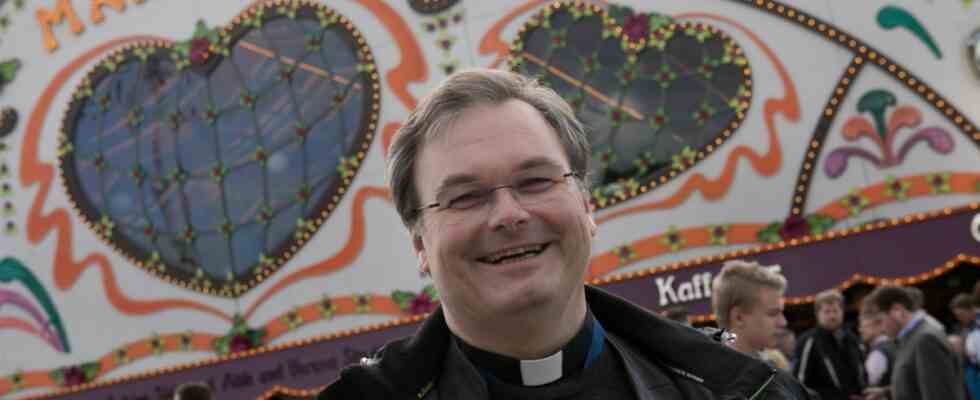A pastor for the Oktoberfest? That sounds unusual, but it’s been around for years. In fact, since 2014, two priests have taken care of the showmen at the Munich Wiesn. But after the death of the Dominican Father Paul Schäfersküpper, who was the pastor of showmen for Upper Bavaria and Swabia for 18 years until his death at the end of December and was therefore also responsible for the Oktoberfest, Sascha Ellinghaus is now solely responsible for the largest folk festival in the world as national pastor . Until Schäfersküpper’s successor can be filled, he will hold the position “down here” as one of only four showman pastors in Germany, as he says.
Even as a child, he enjoyed going to the circus and the fair and collecting old circus posters as soon as the showmen left town, the 50-year-old says in an interview. During his studies in Paderborn, he lost sight of the industry, does not associate it with the priesthood and thinks his own place is “in a nice baroque parish church, very classic”.
Whereby: The path to the priesthood was not always clear for Ellinghaus. He took a year off between the preliminary theological diploma and the last four semesters of study and gave God an ultimatum during this time: Either you send me the right partner now and thus a signal that my path is different, or I return to the seminary . The divine sign is missing. If things had turned out differently, he could have found favor in graphic design or organizational jobs. As a showman pastor, he can incorporate both into his work today: he designs his church service posters himself and operates his own logistics center in the form of a minibus, which takes him from his headquarters near Bonn through the Federal Republic and the tightly scheduled calendar year.
Because life as a showman’s pastor is exhausting. Sascha Ellinghaus spends about a third of his time on the road and in hotels, trying to meet as many inquiries as possible. “When you love people, you sometimes make commitments that don’t always make chronological and logistical sense. The calendar says ‘no’ and you yourself say ‘yes,'” he says. The occupational hazard of a pastor whose congregation is spread across the country.
“At the folk festival, as in every community, there is light and shadow.”
Ellinghaus can empathize with the showmen all the better, since like them he leads a vagabond life most of the time. This means, on the one hand, working where others celebrate and, on the other hand, maintaining social relationships across distances in time and space. Ellinghaus is also no stranger to constant farewells, not today and even as a child and adolescent it wasn’t like that.
He grew up in Braunschweig, Dortmund, Hamburg, Frankfurt and Herdecke in the Ruhr area. “No, my parents weren’t showmen,” he jokes. With every promotion of his father at a chain of department stores, where at that time colleagues were not promoted to supervisors in the same house, a move is imminent. For teenagers Sascha, this means school, friends, maybe even a change of state every four years. “The difference is: Back then, moving always meant breaking off friendships and finding new ones, today I travel with the same people that I meet somewhere else.”
A melancholy expression in Ellinghaus’ otherwise happy face indicates that the constant post-relocation restart was “sometimes easier, sometimes more difficult”. He prefers to focus on beauty. This would also include debauchery, which is part of a workplace like the Oktoberfest ad extremum is guided, and religion compatible for him. “At the folk festival, as in every community, there is light and shadow, grace and what the church calls sin. It’s always the question of where I want to look, you can direct your gaze too.” There’s nothing wrong with the alcohol, he thinks you’re welcome to enjoy the beer and points to the cyclist’s half in front of him: “But just to the extent that you don’t put others at a disadvantage.”
Despite all the travel and hotel stays, he doesn’t feel lonely, says Ellinghaus: “It doesn’t matter which fairground I go to: It won’t be anywhere that I don’t know anyone. I’m always at home in my community.” There are enough places of refuge for him on such a festival site, he can move like a family member, through the next back door for a coffee or to the next ride booth for a chat. “I have the feeling that I have a closer heart connection to the people in the circus and at the folk festival than I did before in my parish.”
Baptisms, communions and weddings also take place at folk festivals
Ellinghaus considers most of the showmen to be very traditional. They appreciate that he brings church to them with a sacred pop-up space, whether it’s for a baptism, communion, wedding or ride dedication. This branch of pastoral care has existed since 1956, when Pope Pius XII. authorized the first showmen’s chaplain in an official document to hold services outside of a consecrated church space. A “properly prepared” portable altar was set up as a condition, and Ellinghaus still adheres to it today.
It doesn’t matter whether it’s a mobile organ, lace ceiling or embroidered damask, it’s about “a worthy design, because for the showmen that means regular worship”. Transporting, setting up and maintaining this equipment, which weighs around 400 kilograms, is not only physically demanding, but also takes a lot of preparation time. If his health allows it, Sascha Ellinghaus would like to remain national chaplain until retirement age.
Perhaps there will still be support for the southern Bavarian region by then. But that depends on the respective colleague. “I think showmen need something solid, not too eccentric.” So a pastor you can touch like Sascha Ellinghaus.

